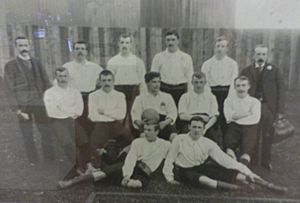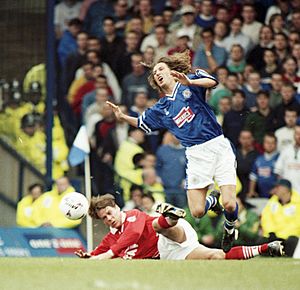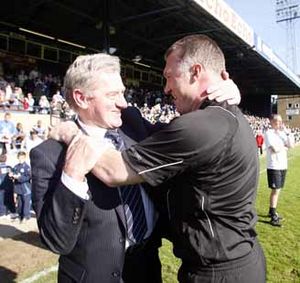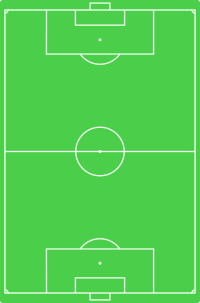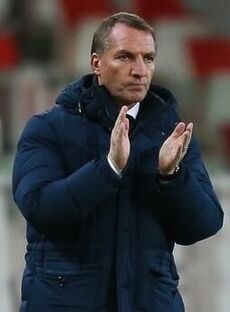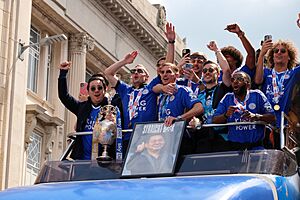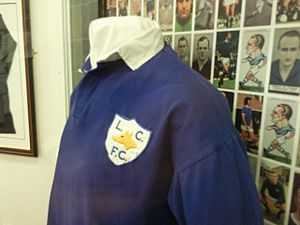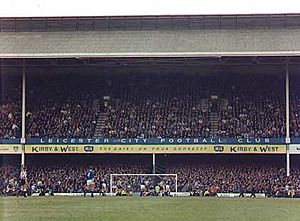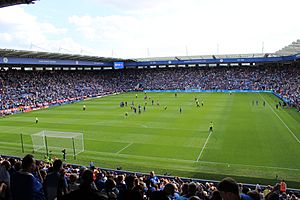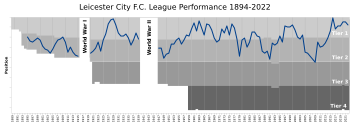Leicester City F.C. facts for kids
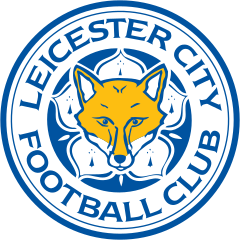 |
||||
| Full name | Leicester City Football Club | |||
|---|---|---|---|---|
| Nickname(s) | The Foxes | |||
| Founded | 1884 (as Leicester Fosse F.C.) |
|||
| Stadium | King Power Stadium | |||
| Stadium capacity |
32,259 | |||
| Owner | King Power | |||
| Chairman | Aiyawatt Srivaddhanaprabha | |||
| Manager | Martí Cifuentes | |||
| League | Premier League | |||
| 2018–19 | Premier League, 9th of 20 | |||
|
||||
Leicester City Football Club is a professional football team from Leicester, England. They are often called "The Foxes." The club plays in the Championship, which is the second-highest league in English football.
The club started in 1884 as Leicester Fosse F.C. They changed their name to Leicester City in 1919. This happened when Leicester officially became a city. The team first played at Filbert Street in 1891. They joined the Football League in 1894. In 2002, they moved to their current home, the King Power Stadium.
Leicester City has won several important trophies. These include one Premier League title, one FA Cup, and three League Cups. They also won two FA Community Shields. Since the year 2000, Leicester is the 6th most successful team in England. They are one of only five clubs to win all three major domestic trophies since 2000. Their 2015–16 Premier League win was a huge surprise. It made them one of only seven clubs to win the Premier League since it began in 1992.
Before 2015–16, Leicester's best league finish was second place in 1928–29. The club has played in European competitions seven times. They reached the UEFA Champions League quarter-finals in 2016–17. They also made it to the UEFA Europa Conference League semi-finals in 2021–22. Leicester has played in the FA Cup final five times. They won their first FA Cup in 2021. They won the League Cup in 1964, 1997, and 2000. They were also finalists in 1964–65 and 1998–99.
Contents
Club History: From Founding to Today
Early Years and Name Change (1884–1949)
The club began in 1884 as "Leicester Fosse." It was started by former students of Wyggeston School. They joined The Football Association (FA) in 1890. Before moving to Filbert Street in 1891, they played at five different grounds. These included Victoria Park.
In 1891, the club also joined the Midland League. They were then chosen to join Division Two of the Football League in 1894. Leicester's first League game was a 4–3 loss to Grimsby Town. Their first League win was the next week against Rotherham United. In 1907–08, they finished second in Division Two. This earned them promotion to the First Division. However, they were relegated after just one season. That season included their biggest loss ever, 12–0 against Nottingham Forest.
In 1919, after World War I, Leicester Fosse faced money problems and stopped playing. The club was then restarted as "Leicester City Football Club." This new name was fitting because Leicester had recently become an official city. In the 1920s, the club did quite well. Under manager Peter Hodge and later Willie Orr, they won the Division Two title in 1924–25. They also had their second-best league finish in 1928–29, coming in second place. But the 1930s were tougher. The club was relegated in 1934–35 and again in 1938–39.
Post-War Era and Cup Finals (1949–2000)
Leicester reached the FA Cup final for the first time in 1949. They lost 3–1 to Wolverhampton Wanderers. A week later, they celebrated staying in Division Two. Leicester won the Division Two championship in 1954. This was helped by Arthur Rowley, one of the club's best strikers. They were relegated the next season but returned in 1957. Rowley scored a club record 44 goals that season. Leicester stayed in Division One until 1969, their longest time in the top league.
Under manager Matt Gillies, Leicester reached the FA Cup final two more times. They lost in 1961 and 1963. Because they lost to Tottenham Hotspur (who won both the league and cup) in 1961, Leicester played in the 1961–62 European Cup Winners' Cup. In the 1962–63 season, the team was called the ""Ice Kings"". They led the First Division during winter and finished fourth. Gillies led Leicester to their first trophy in 1964. They beat Stoke City to win the League Cup. They reached the League Cup final again the next year but lost to Chelsea. Matt Gillies left in 1968. His replacement, Frank O'Farrell, could not stop them from being relegated. However, the club reached the FA Cup final in 1969, losing 1–0 to Manchester City.
In 1971, Leicester were promoted back to the First Division. They also won the Charity Shield for the first time. This was because double winners Arsenal were busy with European games. Second Division champions Leicester played FA Cup runners-up Liverpool and won 1–0. Jimmy Bloomfield became manager and kept the team in the First Division. Leicester reached the FA Cup semi-final in 1973–74.
Frank McLintock became manager in 1977. The club was relegated that season, and McLintock resigned. Jock Wallace then led Leicester to win the Second Division championship in 1980. Wallace could not keep Leicester in the First Division. But they reached the FA Cup semi-final in 1982. Under Wallace, a famous player named Gary Lineker started playing for the first team. Gordon Milne became the next manager and got the team promoted in 1983. Lineker helped Leicester stay in the First Division. He was sold to Everton in 1985. Two years later, Leicester was relegated.
Milne left in 1986. David Pleat took over in 1987 but was sacked in 1991. Leicester was in danger of being relegated to the Third Division. Gordon Lee took charge until the end of the season. Leicester won their last game, which kept them from going down to the third tier.
Brian Little became manager in 1991. By the end of the 1991–92 season, Leicester reached the play-off final. They wanted a spot in the new Premier League. But they lost to Blackburn Rovers. The club reached the play-off final again the next year. They lost 4–3 to Swindon Town. In 1993–94, Leicester won the play-offs. They beat Derby County 2–1 in the final and were promoted. Little left in November to manage Aston Villa. His replacement, Mark McGhee, could not save Leicester from finishing near the bottom in 1994–95.
McGhee left suddenly in December 1995. He was replaced by Martin O'Neill. Under O'Neill, Leicester got into the 1996 Football League play-offs. They beat Crystal Palace 2–1 in the final. This earned them promotion to the Premier League. After being promoted, Leicester stayed in the Premier League for four seasons. O'Neill ended Leicester's 33-year wait for a major trophy. They won the League Cup twice, in 1997 and 2000. They were also runners-up in 1999. This meant the club played in the UEFA Cup in 1997–98 and 2000–01. These were the club's first European games since 1961. In June 2000, O'Neill left Leicester City to manage Celtic.
Challenges and Comeback (2000–2015)
Peter Taylor, a former England under-21 coach, replaced Martin O'Neill. Leicester started well under Taylor. They were at the top of the Premier League for two weeks. But a poor end to the season saw them finish 13th.
Taylor was sacked after a bad start to the 2001–02 season. His replacement, Dave Bassett, lasted only six months. His assistant, Micky Adams, took over. Leicester won only five league matches that season and were relegated.
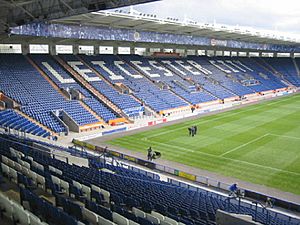
Leicester moved to the new 32,314-seat Walkers Stadium in 2002. This ended 111 years at Filbert Street. Walkers, a crisp company from Leicester, bought the naming rights for ten years. In October 2002, the club faced serious money problems. They had debts of £30 million. This was due to lost TV money and high player wages. The cost of the new stadium also played a part. Adams was not allowed to buy new players for most of the season. But the club was saved by a group led by Gary Lineker. Adams led Leicester to finish second in Division One. They were promoted back to the Premier League. However, Leicester only stayed in the top league for one season. They were relegated to the Championship.
Adams resigned in October 2004. Craig Levein became the new boss. This was not a successful time, and Levein was sacked after 15 months. He failed to get the Foxes close to promotion. Assistant manager Rob Kelly took over temporarily. After winning three out of four matches, he was given the job permanently. Kelly kept Leicester safe from relegation.
In October 2006, Milan Mandarić bought the club. On April 11, 2007, Rob Kelly was sacked. Nigel Worthington became caretaker manager. Worthington saved the club from relegation. But he was not offered the job permanently. On May 25, 2007, Martin Allen became the new manager. Allen's relationship with Mandarić became difficult. He left after only four matches. On September 13, 2007, Mandarić announced Gary Megson as the new manager. Megson left on October 24, 2007, after only six weeks. He went to Bolton Wanderers. Frank Burrows and Gerry Taggart became temporary managers.
On November 22, Ian Holloway became manager. He was the first Leicester manager in over 50 years to win his first league match. They beat Bristol City 2–0. But this success did not last. Leicester was relegated from the Championship at the end of the 2007–08 season. Holloway left, and Nigel Pearson replaced him.
The 2008–09 season was Leicester's first time outside the top two leagues. But they quickly bounced back. They returned to the Championship in 2008–09. They won League One as champions. In the 2009–10 season, Leicester finished fifth. They reached the Championship play-offs. They lost to Cardiff City in a penalty shoot-out. Pearson then left Leicester to manage Hull City. On July 7, 2010, Paulo Sousa became Pearson's replacement.
In August 2010, King Power bought the club. Vichai and his son Aiyawatt Srivaddhanaprabha led the new owners. On October 1, 2010, Paulo Sousa was sacked. Leicester was at the bottom of the Championship. Two days later, Sven-Göran Eriksson became the new manager. On February 10, 2011, Vichai became the new chairman.
Leicester was expected to be promoted in the 2011–12 season. But on October 24, 2011, Eriksson left the club. Three weeks later, Nigel Pearson returned as manager. Pearson led the Foxes to a sixth-place finish in 2012–13. This put them in the Championship play-offs. However, Leicester lost the semi-final to Watford.
In 2014, Leicester made a big step forward. They won 2–1 against Sheffield Wednesday. This, combined with other results, meant Leicester City was promoted to the Premier League. It was their first time back in ten years. Later that month, Leicester became champions of the 2013–14 Championship. This was their joint-record 7th second-tier title.
Leicester started their first Premier League season since 2004 well. They drew 2–2 with Everton. They then won their first Premier League game since 2004, beating Stoke City 1–0. On September 21, 2014, Leicester made an amazing comeback. They beat Manchester United 5–3. They were the first team to beat Manchester United after being two goals down in the Premier League.
During the 2014–15 season, the team struggled. They were at the bottom of the league with only 19 points from 29 matches. By April 3, 2015, they were seven points from safety. But seven wins in their last nine games meant the Foxes finished 14th. They ended the season with a 5–1 win over Queens Park Rangers. Leicester's comeback was called one of the Premier League's greatest escapes. They were only the third team to survive after being bottom at Christmas. On June 30, 2015, Nigel Pearson was sacked. The club said their "working relationship is no longer viable."
On July 13, 2015, Claudio Ranieri became the new manager. Many people were unsure about Ranieri. But Leicester had an amazing start to the 2015–16 season. Striker Jamie Vardy scored in 11 straight matches. This broke a Premier League record. On December 19, Leicester beat Everton 3–2. They were at the top of the Premier League on Christmas Day. They had been at the bottom exactly 12 months before.
The Club's Golden Era (2016–2021)
The club qualified for the UEFA Champions League for the first time on April 10, 2016. This was after a 2–0 win at Sunderland. The 2016–17 Champions League season was their first European competition in 15 years. On May 2, 2016, Leicester City won the Premier League. This happened after Chelsea drew 2–2 with Tottenham Hotspur. Betting companies thought Leicester's win was very unlikely. They offered odds of 5,000–1. This led to the biggest payout in British sports history. Many newspapers called Leicester's title success the greatest sports shock ever.
Leicester became known for their fast counterattacking style. They also had strong defense. Former boss Nigel Pearson was praised for setting up the team. Richard Scudamore, head of the Premier League, said: "If this was a once in every 5,000-year event, then we've effectively got another 5,000 years of hope ahead of us."
Leicester did well in the UEFA Champions League. But they struggled in the Premier League during 2016–17. They were often in the bottom half of the table. In December 2016, Ranieri won coach of the year. Leicester won team of the year at the BBC Sports Personality of the Year. However, on February 23, 2017, Ranieri was sacked. This was because the club was doing poorly. They were only one point above the relegation zone. Many people were upset by this decision. Craig Shakespeare took over as temporary manager. In his first game, Leicester won 3–1 against Liverpool. After two wins, Shakespeare became manager until the end of the season.
Leicester was in Group G of the 2016–17 UEFA Champions League. They played against Porto, Copenhagen, and Club Brugge. They went undefeated in their first five matches. They moved to the knockout stages as group winners. Leicester then played La Liga club Sevilla. They lost 2–1 in the first game. But in the second game at King Power Stadium, Leicester won 2–0. This meant they won 3–2 overall and moved to the quarter-finals. They then played Atlético Madrid. They drew 1–1 in the second game. But they lost 2–1 overall after losing 1–0 in the first game. This ended Leicester's European journey. They left the competition as quarter-finalists. Leicester did not lose any home games in their 2016–17 Champions League campaign.
Craig Shakespeare was appointed full-time manager. But after a bad start to the season, he was sacked in October 2017. Leicester was in 18th place. Claude Puel replaced him on October 25, 2017. By Christmas, Leicester was in 8th place. They finished 9th at the end of the season.
On October 27, 2018, after a home match, a helicopter carrying chairman Vichai Srivaddhanaprabha and four others crashed outside the stadium. All five people died. One year later, The Vichai Srivaddhanaprabha Memorial Garden opened. The Khun Vichai Srivaddhanaprabha Statue was unveiled on April 4, 2022.
In early 2019, Leicester had a seven-game winless streak. After a 1–4 home loss, manager Claude Puel was sacked on February 24, 2019. Leicester was in 12th place. Former Liverpool manager Brendan Rodgers was appointed. The club finished the season in 9th place again.
The 2019–20 season started well. The team earned 38 points from their first 16 matches. This included a record eight-game winning streak. On October 25, 2019, Leicester won 9–0 away at Southampton. This was the joint-largest win in Premier League history. It was also the largest away win in English top-flight history. That season, the club reached the League Cup semi-final. They lost to Aston Villa over two games. Leicester was in the top four for most of the season. But they struggled at the end. They won only two of their last nine games after the season restarted due to the coronavirus pandemic. Three losses in their last four matches meant they finished 5th. This was their second-highest Premier League finish. It secured a spot in the UEFA Europa League.
The club's money was affected by the COVID pandemic. Despite this, the club spent £57 million on new players in summer 2020. They also sold players for £46 million. After finishing 5th again in the 2020–21 Premier League, Leicester qualified for the UEFA Europa League again. On May 15, 2021, Leicester City won the FA Cup for the first time. They had lost four previous finals. Youri Tielemans scored the only goal against Chelsea at Wembley Stadium. The club became the 6th most successful team in England since 2000. They are one of only five clubs to win all three major domestic trophies since 2000.
Recent Seasons and Challenges (2021–Present)
In the summer of 2021, Leicester spent over £50 million on new players. But they did not sell any key players for high profit. This was different from their usual approach. This spending increased Leicester's wages compared to their income. The club did not qualify for European football in the 2021–22 season. They finished in 8th place. On August 7, 2021, Leicester won the FA Community Shield for the second time. In their 2021–22 UEFA Europa League campaign, Leicester finished third in their group. They then moved to the new UEFA Europa Conference League. They reached their first European semi-final. They lost to AS Roma over two games. Leicester's spending in summer 2022 was limited. This was due to concerns about breaking Financial Fair Play rules. However, the club was also focusing on improving its facilities. This was to compete better with the Premier League's 'big six' teams.
Brendan Rodgers left the club on April 2, 2023. He had been in charge for four years. There were ten games left, and the team was in the relegation zone. Dean Smith was appointed until the end of the season. On May 28, Leicester City was relegated. This happened despite a 2–1 home win over West Ham United. Everton won their game, which meant Leicester went down. They were relegated with the highest ever squad value and wage bill outside of the Premier League's top six clubs. The 2022–23 season ended their nine-year stay in the Premier League. Leicester became only the second former Premier League champion to be relegated. The first was Blackburn Rovers in 1998–99.
On June 16, 2023, Enzo Maresca became the club's new manager. Leicester had their best start to a league season under him. They gained promotion back to the Premier League as champions. This was Leicester's eighth second-tier title, a record for the division.
In March 2024, the club faced a charge from the Premier League. This was for allegedly breaking financial rules in the 2022–23 season. On September 3, Leicester's appeal against these charges was successful. On June 3, 2024, Enzo Maresca left the club to join Chelsea. Leicester appointed Steve Cooper as his replacement on June 20. But Cooper was sacked after five months on November 25. Five days later, on November 29, Ruud van Nistelrooy was named Leicester's new manager.
On April 20, 2025, the club was relegated from the Premier League again. This was their second relegation in three years. On May 20, 2025, Leicester was charged by the Premier League. This was for three separate breaches of financial rules during the 2023–24 season. On June 27, 2025, the club and Ruud van Nistelrooy agreed to end his contract. On July 15, 2025, the club appointed Martí Cifuentes as manager.
Club Identity and Traditions
|
|
| Leicester City's first home colours worn from 1884 to 1886. |
Leicester City's traditional home colors are royal blue shirts, white shorts, and either white or blue socks. These colors have been used for most of the team's history. Since the 2015–16 season, the club has mostly played in all-blue kits. In 1948, a picture of a fox was first added to the club's badge. Since 1992, the club's badge has shown a fox's head. It is placed on a cinquefoil, similar to the coat of arms of Leicester.
When the club moved to a new stadium in 2002, the badge changed slightly. The updated design was a main feature on the outside of the West Stand. The club's badge has changed more since then. The current badge has been used since 2010. For the 2009–10 season, which was the club's 125th anniversary, a special badge was worn. For that season's away kit, the team also wore their first colors (black shirts, white shorts, and black socks). This kit returned for the 2023–24 season.
In 1941, the club started playing the "Post Horn Galop" at home matches. This signaled both teams entering the field. Today, the tune is still played live for the first half. A modern version is played over the stadium speakers for the second half. The club also plays a modern version of their song "When You're Smiling" before home games. This song has been connected to the club since the late 1970s. Foxes Never Quit is the club's motto. These words are placed above the tunnel inside the stadium.
Kit Suppliers and Shirt Sponsors
| Year | Kit Manufacturer | Primary Shirt Sponsor | Sleeve Sponsor |
|---|---|---|---|
| 1972–1976 | Bukta | None | None |
| 1976–1979 | Admiral | ||
| 1979–1983 | Umbro | ||
| 1983–1986 | Admiral | Ind Coope | |
| 1986–1987 | John Bull | ||
| 1987–1988 | Walkers Crisps | ||
| 1988–1990 | Scoreline | ||
| 1990–1992 | Bukta | ||
| 1992–1999 | Fox Leisure | ||
| 1999–2000 | Fox Leisure / Le Coq Sportif | ||
| 2000–2001 | Le Coq Sportif | ||
| 2001–2003 | LG | ||
| 2003–2005 | Alliance & Leicester | ||
| 2005–2007 | JJB Sports | ||
| 2007–2009 | Jako | Topps Tiles | |
| 2009–2010 | Joma | LOROS Hospice Care | |
| 2010–2012 | Burrda | King Power | |
| 2012–2016 | Puma | ||
| 2017–2018 | Siam Commercial Bank | ||
| 2018–2020 | Adidas | Bia Saigon | |
| 2020–2021 | Tourism Authority of Thailand / King Power | ||
| 2021–2023 | FBS (international brokerage company) | ||
| 2023–2024 | King Power | ||
| 2024– | BC.GAME |
Since 2018, Adidas has made Leicester City's kits. The club's current main shirt sponsor is BC.GAME. The first sponsor logo on a Leicester shirt was Ind Coope in 1983. Walkers Crisps is the club's official snack partner. Walkers has a long history with the club. They sponsored their shirts from 1987 to 2001. They also sponsored the stadium from 2002 to 2011.
Stadium and Training Facilities
In their early years, Leicester played at many different grounds. But since joining the Football League, they have only played at two. When they first started, they played on a field near Fosse Road. This is why they were first called Leicester Fosse. They then moved to Victoria Park. After that, they played at Belgrave Road. When the club became professional, they moved to Mill Lane. After leaving Mill Lane, they played at the County Cricket ground. The club then found land near Filbert Street and moved there in 1891.
Some improvements were made to Filbert Street in the early 1900s. In 1927, a new two-tier stand was built. It was called "the Double Decker." This stand stayed until the ground closed in 2002. The ground did not change much until 1993. That's when the Main Stand was replaced by the new Carling Stand.
The club moved from Filbert Street in 2002. They moved to a new 32,500-seat stadium. It is less than 300 yards away. The new stadium's address, Filbert Way, keeps a link to their old home. The first match at the new stadium was a 1–1 draw against Athletic Bilbao. The first competitive match was a 2–0 win against Watford.
The stadium was called the Walkers Stadium until 2011. This was part of a sponsorship deal with Walkers. On August 19, 2010, the new owners, King Power, wanted to rename the stadium King Power Stadium. They also planned to make it bigger if Leicester was promoted. On July 5, 2011, it was announced that the Walkers Stadium would be known as King Power Stadium.
The stadium currently holds 32,259 people. Plans to make it bigger to 40,000 seats were approved in December 2023. In 2020, the club moved to a new training complex in Seagrave. It is considered one of the best training facilities in the world. The club's old training ground, Belvoir Drive, is now used by Leicester City Women.
Club Rivalries and Fan Support
Leicester City's main rivals are Nottingham Forest, Derby County, and Coventry City. There are also smaller rivalries with Chelsea (since around 1980) and more recently with Tottenham Hotspur. This is because both teams competed for the 2015–16 Premier League title. The rivalry between Leicester and Forest is still strong. It is especially noticeable on the border of the two cities and counties.
The club's song, "When You're Smiling," is sung by fans at home and away games. It started in the late 1970s. A modern version is played before home matches.
European Competitions Record
Leicester City has played in several European competitions. Here is a summary of their results:
| Season | Competition | Round | Club | Home | Away | Aggregate |
|---|---|---|---|---|---|---|
| 1961–62 | European Cup Winners' Cup | PR | 3–1 | 4–1 | 7–2 | |
| 1R | 1–1 | 0–2 | 1–3 | |||
| 1997–98 | UEFA Cup | 1R | 0–2 | 1–2 | 1–4 | |
| 2000–01 | UEFA Cup | 1R | 1–1 | 1–3 | 2–4 | |
| 2016–17 | UEFA Champions League | GS | 1–0 | 0–5 | 1st | |
| 2–1 | 3–0 | |||||
| 1–0 | 0–0 | |||||
| R16 | 2–0 | 1–2 | 3–2 | |||
| QF | 1–1 | 0–1 | 1–2 | |||
| 2020–21 | UEFA Europa League | GS | 4–0 | 3–3 | 1st | |
| 2–0 | 2–1 | |||||
| 3–0 | 0–1 | |||||
| R32 | 0–2 | 0–0 | 0–2 | |||
| 2021–22 | UEFA Europa League | GS | 2–2 | 2–3 | 3rd | |
| 1–1 | 4–3 | |||||
| 3–1 | 0–1 | |||||
| UEFA Conference League | KPO | 4–1 | 3–1 | 7–2 | ||
| R16 | 2–0 | 1–2 | 3–2 | |||
| QF | 0–0 | 2–1 | 2–1 | |||
| SF | 1–1 | 0–1 | 1–2 |
Club Management and Staff
Leicester City's current manager is Martí Cifuentes. He was appointed on July 15, 2025.
Nigel Pearson and Peter Hodge have both managed the club twice. Before Peter Hodge was hired, the club did not have an official manager. The board and a special committee handled most team decisions. Hodge was the first to set up a system where the manager had full control over players, staff, and team plans.
| Directors & Senior Management | |
|---|---|
| Role | Person |
| Chairman | Aiyawatt Srivaddhanaprabha |
| Vice Chairman | Apichet Srivaddhanaprabha |
| Chief Executive | Susan Whelan |
| Finance Director | Kevin Davies |
| Director of Football | Jon Rudkin |
| Football Operations Director | Andrew Neville |
| Operations Director | Anthony Mundy |
| Communications Director | Anthony Herlihy |
| HR Director | Liam Dolan-Barr |
| General Counsel | Matthew Phillips |
| Management Staff | |
|---|---|
| Role | Person |
| Manager | Martí Cifuentes |
| Assistant Manager | Xavi Calm |
| First Team Coach | Andy King |
| Goalkeeper Coach | Vacant |
| Set Piece Coach | Andrew Hughes |
| Head of Fitness & Conditioning | Matt Reeves |
| Head of Medicine | Dr. Simon Morris |
| Head Physiotherapists | Gary Silk Niall Stevens |
| Kit Manager | Paul McAndrew |
| Head of Senior Player Recruitment | Martyn Glover |
| Academy Director | Jon Rudkin |
Player Information and Statistics
Current First-Team Squad
|
|
Player of the Year Awards
Leicester City fans vote for their Player of the Year at the end of each season.
|
|
|
Players in English Hall of Fame
These former Leicester players are in the English Football Hall of Fame:
 Gordon Banks (2002)
Gordon Banks (2002) Peter Shilton (2002)
Peter Shilton (2002) Gary Lineker (2003)
Gary Lineker (2003) Don Revie (2004, as a manager)
Don Revie (2004, as a manager) Frank McLintock (2009)
Frank McLintock (2009)
Football League 100 Legends
The Football League 100 Legends is a list of "100 legendary football players" from 1998. It includes these former Leicester City players:
 Arthur Rowley
Arthur Rowley Gordon Banks
Gordon Banks Frank McLintock
Frank McLintock Peter Shilton
Peter Shilton Gary Lineker
Gary Lineker
Players with Many Appearances for Leicester
Graham Cross holds the record for most Leicester appearances, with 600 games. Adam Black holds the record for most league appearances with 528.
 Graham Cross 600
Graham Cross 600 Adam Black 557
Adam Black 557 Jamie Vardy 500
Jamie Vardy 500 Kasper Schmeichel 479
Kasper Schmeichel 479 Hugh Adcock 460
Hugh Adcock 460 Mark Wallington 460
Mark Wallington 460 Steve Walsh 450
Steve Walsh 450 Arthur Chandler 419
Arthur Chandler 419 John Sjoberg 414
John Sjoberg 414 Mal Griffiths 409
Mal Griffiths 409 Steve Whitworth 401
Steve Whitworth 401 Andy King 379
Andy King 379 Sep Smith 373
Sep Smith 373 Mike Stringfellow 370
Mike Stringfellow 370 Richie Norman 365
Richie Norman 365 Gordon Banks 356
Gordon Banks 356 John O'Neill 345
John O'Neill 345 Dave Gibson 339
Dave Gibson 339 Peter Shilton 339
Peter Shilton 339 Colin Appleton 333
Colin Appleton 333 Dennis Rofe 324
Dennis Rofe 324 Wes Morgan 323
Wes Morgan 323 Paul Ramsey 322
Paul Ramsey 322 Arthur Rowley 321
Arthur Rowley 321 Arthur Lochhead 320
Arthur Lochhead 320 Muzzy Izzet 319
Muzzy Izzet 319 Ian Wilson 318
Ian Wilson 318 Derek Hines 317
Derek Hines 317 Marc Albrighton 313
Marc Albrighton 313 Lenny Glover 306
Lenny Glover 306
Players with Many Goals for Leicester
Arthur Chandler is the club's all-time top goal scorer with 273 goals. He also scored in 8 straight matches in 1924–25. The most goals in one season is 44 by Arthur Rowley in 1956–57. The fastest goal in club history was by Matty Fryatt in 9 seconds in April 2006.
Jamie Vardy broke the Premier League record by scoring in 11 straight games in 2015–16. He scored 13 goals during that run. Vardy became the first Leicester player since Gary Lineker in 1984–85 to score 20 top-flight goals. He finished with 23 goals and won the Premier League Golden Boot.
 Arthur Chandler 273
Arthur Chandler 273 Arthur Rowley 265
Arthur Rowley 265 Jamie Vardy 200
Jamie Vardy 200 Ernie Hine 156
Ernie Hine 156 Derek Hines 117
Derek Hines 117 Arthur Lochhead 114
Arthur Lochhead 114 Gary Lineker 103
Gary Lineker 103 Mike Stringfellow 97
Mike Stringfellow 97 Johnny Duncan 95
Johnny Duncan 95 Jimmy Walsh 91
Jimmy Walsh 91 Jack Lee 84
Jack Lee 84 Alan Smith 84
Alan Smith 84 Frank Worthington 78
Frank Worthington 78 Mal Griffiths 76
Mal Griffiths 76 Ken Keyworth 76
Ken Keyworth 76 Danny Liddle 71
Danny Liddle 71 Arthur Maw 64
Arthur Maw 64 Matty Fryatt 62
Matty Fryatt 62 Andy King 62
Andy King 62 Steve Walsh 62
Steve Walsh 62 Kelechi Iheanacho 61
Kelechi Iheanacho 61 Steve Lynex 60
Steve Lynex 60 David Nugent 59
David Nugent 59 Fred Shinton 58
Fred Shinton 58 Jack Bowers 56
Jack Bowers 56 James Maddison 55
James Maddison 55 Dave Gibson 53
Dave Gibson 53 Jackie Sinclair 53
Jackie Sinclair 53 Hugh Adcock 52
Hugh Adcock 52 George Dewis 51
George Dewis 51 Gary McAllister 51
Gary McAllister 51
Transfer Records
The record fee Leicester paid for a player was about £32-40 million for Youri Tielemans from AS Monaco. The highest fee Leicester received for a player was about £80 million from Manchester United for Harry Maguire. This was the highest fee ever for a defender at the time.
Attendance Records
Leicester's record home attendance is 47,298. This was for an FA Cup match against Tottenham Hotspur at Filbert Street in 1928. The current record at King Power Stadium is 32,242. This was for a Premier League match against Sunderland in 2015.
Team Performance Records
Leicester's highest league finish is first in the Premier League in 2015–16. The club holds the record for most second-tier titles with eight.
Leicester's longest unbeaten run in the league was 23 games. This happened between November 2008 and March 2009. The club's longest run of wins in league football is nine. This was achieved between December 2013 and February 2014.
In the 2015–16 season, Leicester set many new club records. They had the fewest losses in any Premier League season. They also had the fewest away defeats in any top-flight season. They achieved the most consecutive wins in the top flight. These wins were against Watford, Newcastle United, Crystal Palace, Southampton, and Sunderland. The King Power Stadium crowds saw their team lose only once in the Premier League that season.
Leicester made their UEFA Champions League debut in the 2016–17 season. They became the third English team to win on their Champions League debut. They were also the first English team to win away on their Champions League debut. They won all three of their first games in the competition. Leicester is the first and only team in Champions League history to keep clean sheets in their first four games. In March 2017, the club became the 50th to reach the UEFA Champions League quarter-finals.
On October 25, 2019, Leicester set a record for the biggest away win in English top-flight history. They beat Southampton 9–0. This also tied the record for the biggest win in Premier League history. Leicester City holds records for the biggest defeat, biggest away win, and highest-scoring draw in the top tier.
On May 15, 2021, Leicester City won the FA Cup for the first time. Their record signing Youri Tielemans scored the winning goal against Chelsea.
On May 28, 2023, the club was relegated from the Premier League. They had the highest squad value and player wages outside of the Premier League's top six clubs at the time.
In the 2023–24 season, the club had its best start to a league season. They set a new record of six straight away league wins. They also matched the record of nine consecutive league wins. They went four home matches without letting opponents score for the first time since 1973.
League History Overview
Since joining the Football League in 1894, Leicester City has spent almost all seasons in the top two leagues of English football. In the 2008–09 season, they played in League One, the third tier. This was after being relegated from the Championship. However, the club quickly returned to the second tier. They were promoted as 2008–09 League One champions.
|
|
|
|
|
|
L1 = Level 1 of the football league system; L2 = Level 2 of the football league system; L3 = Level 3 of the football league system.
- Seasons spent at Level 1 of the football league system: 56
- Seasons spent at Level 2 of the football league system: 63
- Seasons spent at Level 3 of the football league system: 1
(up to and including 2024–25)
Club Honours and Trophies
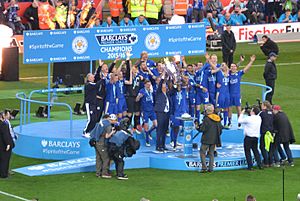
Leicester City is one of only five clubs to have won the Premier League, FA Cup, and League Cup since 2000. The other clubs are Manchester United, Manchester City, Chelsea, and Liverpool. Since the year 2000, they are the 6th most successful club in English football. They are also one of 14 clubs to have won all four major domestic competitions. The club holds the record for the most second division titles with eight.
League Titles
- First Division / Premier League (top league)
- Champions: 2015–16
- Runners-up: 1928–29
- Second Division / First Division / Championship (second league)
- Champions (8): 1924–25, 1936–37, 1953–54, 1956–57, 1970–71, 1979–80, 2013–14, 2023–24
- Runners-up: 1907–08, 2002–03
- Play-off winners: 1994, 1996
- League One (third league)
- Champions: 2008–09
Cup Wins
- FA Cup
- Winners: 2020–21
- Runners-up: 1948–49, 1960–61, 1962–63, 1968–69
- League Cup
- Winners: 1963–64, 1996–97, 1999–2000
- Runners-up: 1964–65, 1998–99
- FA Charity Shield / FA Community Shield
- Winners: 1971, 2021
- Runners-up: 2016
See also
 In Spanish: Leicester City Football Club para niños
In Spanish: Leicester City Football Club para niños
 | James Van Der Zee |
 | Alma Thomas |
 | Ellis Wilson |
 | Margaret Taylor-Burroughs |


